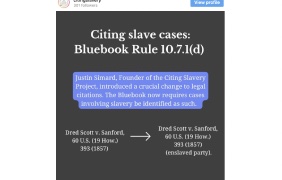This story starts — but certainly doesn’t end — in 19th century Maryland, when John Townshend updated his will.
Townshend grew convinced at the end of his life that God would punish him if he did not free the enslaved people he owned and give them all of his property. But Townshend’s relatives challenged his final wishes in court, arguing that his decision had been the result of a delusion.
That 1848 case was the first U.S. appearance of what became known as the “insane delusion rule,” which remains grounds for contesting wills to this day. And Townshend v. Townshend itself has been cited in at least 70 other cases across the country — from New Hampshire to California — over the years, as recently as 2007.
It’s one of thousands of cases involving enslaved people that lawyers and judges continue to cite as good precedent, more than a century after the 13th Amendment abolished slavery in the U.S.
Justin Simard, an assistant professor at Michigan State University’s College of Law, estimates there are about 11,000 such cases out there — and about one million more that use them to back up their arguments.
“I’ve done some analysis just with a sample of cases and concluded that 18% of all published American cases are within two steps of a slave case, so they either cite the slave case or cite a case that cites a slave case,” Simard tells NPR. “The influence is really, really extensive.”
Simard has spent years documenting them, with the help of some two dozen law students.
The result is the Citing Slavery Project, a comprehensive online database (and map) of slave cases and the modern cases that cite them as precedent. They expect to add the last of their nearly 9,000 collected cases to the website this summer.
The project aims to push the legal profession to grapple with its links to slavery, an overdue reckoning that Simard hopes will start with lawyers and judges acknowledging their use of the troubling precedents.
He says 80% of the time judges don’t mention that these cases involve slavery at all, either because they’re unaware or uncomfortable.
“We’re not saying don’t cite them,” he explains. “All I’m asking people to do is just don’t cite them without acknowledgement, without thinking through whether it actually makes sense to cite them, which I think is a pretty reasonable thing to ask.”
NPR has reached out to the American Bar Association and American Judges Association for comment.
As part of that effort, Simard successfully advocated for the Bluebook — the country’s legal citation style guide — to add a rule requiring cases involving enslaved people to be labeled with a parenthetical, just as moot or overturned cases are.
Learn more
https://www.npr.org/2023/06/14/1181834798/slave-cases-precedent-us-legal-system





